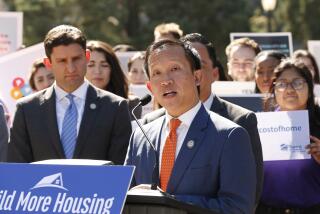Cities Liable Only for Actions of Top Officials, High Court Rules
- Share via
WASHINGTON — The Supreme Court on Wednesday gave cities a broad shield from lawsuits that allege violation of constitutional rights, ruling that cities are liable only when top “municipal policymakers” caused the offense at issue.
The high court ruled, 7 to 1, that only officials such as the mayor and city councilmen speak for the entire city and are responsible for its actions. Therefore, if a department chief or lower official allegedly violates the rights of an employee or citizen, only the official, not the city, can be sued.
The opinion could have an impact on suits ranging from challenges by whistle-blowers and female employees who are harassed by supervisors to complaints against police for use of excessive force.
Clarifies Prior Ruling
In limiting cities’ legal vulnerability, the justices clarified a 10-year-old ruling that made local governments liable only for actions by those “whose edict or acts may fairly be said to represent official policy.” Since then, the justices have struggled over defining what actions constitute official policy.
Charles Oldham, an attorney for a former St. Louis city employee who was the losing party in Wednesday’s decision, said that now, “for all practical purposes, you can’t sue the city.” No top city official is going to announce a policy to punish whistle-blowers, he pointed out.
But attorney Benna Solomon, representing the National League of Cities and the U.S Conference of Mayors, said that aggrieved parties still have legal recourse. “If it is a repeated act, if it was ratified by the higher-ups or if it is a matter of policy: in all those cases, you can sue and the city can be held liable,” she said.
The decision came in the case of James H. Praprotnik, a mid-level city architect in St. Louis who said he was demoted and later dismissed by his supervisors after he publicly criticized a plan to put a “rusting steel sculpture” in a city park.
In 1984, a jury found the city liable for violating his free speech rights and awarded him $30,000, although the city officials named as defendants in his suit were acquitted. An appeals court affirmed that judgment in 1986.
Justice Sandra Day O’Connor, writing for a plurality of the court in the case (St. Louis vs. Praprotnik, 86-772), characterized the architect’s demotion as a one-time event that neither represented city policy nor gained approval by the city’s highest officials.
Not ‘Makers of Policy’
Even if several city officials conspired to get Praprotnik demoted and eventually laid off, this does not create grounds for a successful suit against the city, O’Connor said. Their actions say “nothing about the actions of those whom the law established as the makers of municipal policy in matters of personnel administration,” she wrote. O’Connor was joined by Chief Justice William H. Rehnquist and Justices Byron R. White and Antonin Scalia.
Justices William J. Brennan Jr., Thurgood Marshall and Harry A. Blackmun agreed that Praprotnik’s suit should be denied, but they complained that O’Connor’s ruling goes too far by exempting “all but a small minority of actual city policy-makers.”
In dissent, Justice John Paul Stevens said that the city should be held liable because 16 officials, including some who were close aides to the mayor, had been involved in the actions against Praprotnik.
More to Read
Sign up for Essential California
The most important California stories and recommendations in your inbox every morning.
You may occasionally receive promotional content from the Los Angeles Times.














